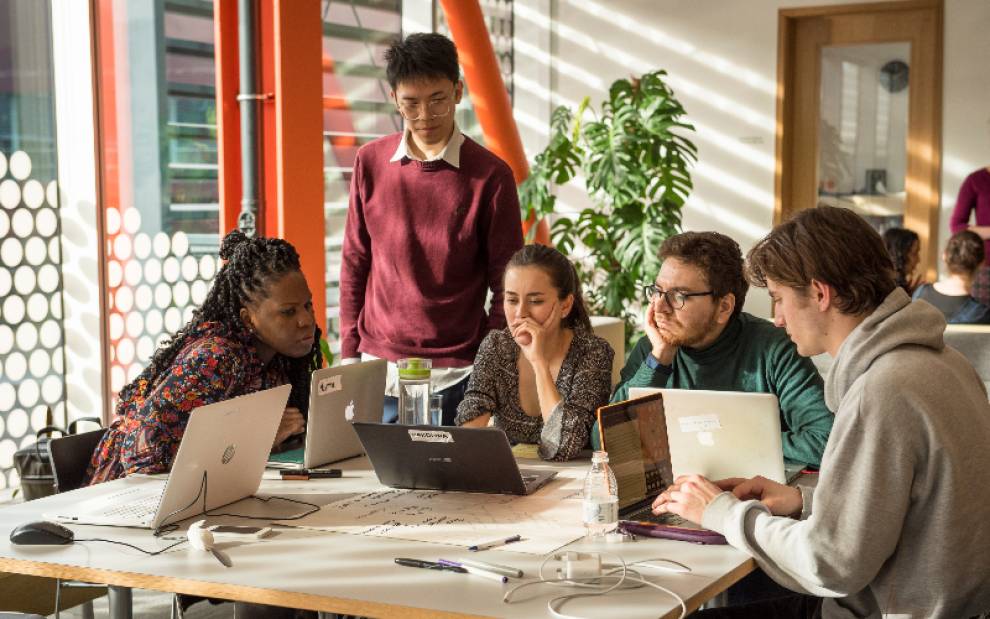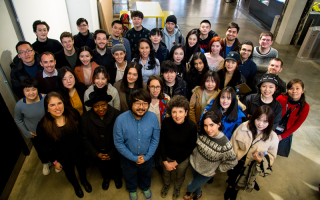Global Prosperity MSc takes you to the heart of how to think about prosperity, offering a new approach to understanding and influencing the economies of the world and how they impact on people.

Humanity is at a critical moment. Around the world livelihood security and human wellbeing are under threat from a series of intersecting challenges, from climate change to global pandemics, populist politics, toxic environments and declining social solidarity. UCL’s Global Prosperity MSc is designed to foster a new generation of leaders ready to tackle these global challenges and rethink what global prosperity means and entails in different parts of the world. Our MSc programme is dedicated to rethinking and redesigning prosperity for the twenty first century, for everyone. This master’s degree will train you to think critically about current social, economic and political models, and find innovative and inclusive solutions to drive transformations around the world.
About the course
We are living in a world of great abundance of material goods, yet more and more people feel that they are worse off than ever before. Decades of continuous GDP growth has occurred alongside an increase in number of people living precarious lives and the destruction of large parts of the world’s environment.
Have you ever asked yourself what it would look like to live in a truly prosperous world? What would the economy look like? Would we have ended poverty, achieved global sustainability, or live in equitable societies? At the UCL Institute for Global Prosperity, we have re-written the book on what counts as ‘prosperity’ - for whom, how we achieve it, and who engages in conversations about economy, society and governance.
Global Prosperity MSc takes you to the heart of how to think about prosperity, offering a new approach to understanding and influencing the economies of the world and how they impact on people. We are committed to establishing inclusive and innovative strategies that improve lives and livelihoods and invite you to join us in our mission. Our MSc programme is the first one in the world dedicated to redesigning prosperity for the twenty-first century, providing a new vision for the global economy that is in the service of life for people and for planet and is co-produced with the lived experience of communities and citizens around the world. Our novel paradigm rebalances values towards society and environment.
Whilst studying Global Prosperity MSc you will draw on theory and practice in plural economics, political science, sociology, anthropology, ecology, history and philosophy, feminism and gender studies, race and decolonisation, creative arts, fashion and design. You will learn how to rethink and redefine some of the world’s most pressing problems, from wealth inequalities through to unsustainable use of natural resources. By engaging in a range of real-world case studies you will explore the institutional roots of these challenges and interrogate current responses across economics, social science, business, and politics. You will learn to deconstruct current solutions and develop new responses by utilising methods to generate innovative solutions that co-design positive and inclusive change. Over the course of your degree, you will develop your critical thinking, creativity, and the confidence to unleash your potential and use these to develop practical solutions and become a key influencer transforming the world around you and shaping the debate on prosperity.
You will graduate with a new worldview of what prosperity means, encompassing ideas around access to basic services, secure livelihoods, a sense of belonging, and the freedom for individuals to develop, and with the creative and practical skills to conduct transdisciplinary and participatory research and co-produce solutions to some of the world’s most pressing issues.
Who this degree is for
Global Prosperity MSc is for students whose intellectual curiosity is excited by creating social, economic and ecological transformations. You may already have a degree or significant real-world experience in business, social entrepreneurship, government or third sector organisations. You may have a background in humanities, natural or social sciences and have skills in both quantitative and qualitative research. We are seeking students from a diverse range of backgrounds ready to use their knowledge and skills to generate impact globally, as part of a dynamic and inclusive community.
YouTube Widget Placeholderhttps://youtu.be/WBy1KavW3B0?si=K8By3E_wQhvDCyZX
The foundation of your career
Depending on your ambitions, a degree in global prosperity can open an array of career opportunities across policy, social and sustainable entrepreneurship, education, government, the third sector, business and academia.
Our graduates to go on to leadership roles in the public and private sector, working in government and civil service, in sustainability and business, and in the NGO and third sector. They now work in a broad range of roles in policy making, social research, ecological consultancy and others.
After graduating, you can expect to work in the public sector, international organizations, thinktanks, government, consultancy, ESG-related investment, NGOs, the third sector and industry in the UK and overseas. Our alumni have gone on to work in a wide range of places, including the UK’s Foreign, Commonwealth and Development Office, SadaPay (a bank transfer app in Pakistan), and universities, including UCL and UMass.
What our alumni say
Our alumni have gone into major roles in government, business and the third sector and have often maintained close contact with the Institute as partners and collaborators.
“Since graduating, I have been working with an International NGO supporting their Neglected Tropical Diseases programmes, looking at initiatives focusing on public health and disabilities. In this role, I also get to take my learnings from the IGP and re-think traditional development practices.
Read about Ismat's experiences studying on the Global Prosperity MSc
“I have been working on my sustainable start-up with my friends. The business is called Burg, we aim to disrupt the environmentally devastating and inefficient markets of traditional livestock and agriculture via the incredible alternative protein source of crickets.
Read about Adam's experiences studying on the Global Prosperity MSc
Employability
As a Global Prosperity MSc graduate you will have an expansive toolkit of employable skills ready to make change across policy, economics, business, environment and third sector, and take the next step in your career. You will be able to think across and between traditional academic disciplines and apply a range of qualitative and quantitative techniques alongside broader strategic and design/prototyping thinking to find innovative solutions to complex challenges. You will gain key transferable skills in teamwork, communication, digital capabilities with particular software, writing for academic and non-specialist audiences, presentation, visual design, creativity, as well as real world problem-solving skills and methods for building engaged and participatory initiatives.
Networking opportunities
Studying with us means joining the Institute for Global Prosperity community. We have a global network of alumni, partners and collaborators all making positive change in the world, facilitated through our Goodsted platform. Through-out the academic year we host careers and alumni events, allowing current students to engage with alumni and to build on this growing network of change makers. We also host a vibrant public events series, giving you the opportunity to network with researchers, policy makers and professionals whilst discussing the latest in prosperity research and engagement.
Teaching and learning
Our teaching is led by our latest research. Students learn by inquiry, engaging in research lead learning and conducting their own research activities in their areas of specialist interest. Our students come from diverse academic backgrounds and professional backgrounds. Through knowledge sharing and participating peer-to peer activities we encourage our students to share their unique experience and enrich each other’s learning experiences. We value of a diversity and inclusivity of knowledge and place an emphasis on outward facing knowledge production though connection to communities and practitioners beyond the academy.
- Read more about our core modules
The core modules of the Global Prosperity MSc balance learning about essential concepts and theory to give you the foundational knowledge in prosperity thinking, and hands-on design and engagement to give you experience with design thinking and prototyping alongside working practitioners and policymakers.
You will take the following core modules:
- Pathways to prosperity 1: Global legacies
- Researching and measuring global prosperity
- Dissertation
- Pathways to prosperity 2: Society and livelihood
- Collective problem solving for inclusive prosperity
- Read more about our optional modules
Beyond the core modules, you will have the opportunity to tailor your studies by choosing optional modules, covering a broad range of topics, including:
- Debt, finance and prosperity
- China and global prosperity
- Urban futures and prosperity
- Social theories of prosperity
- Prosperity, people and planet
- Conceptual frameworks
- Prosperous and inclusive planetary futures
- New economics of prosperity
- Prosperity from below: The informal, the illicit and the popular
And/or other modules from across UCL, subject to timetabling, availability and approval by the home and teaching department.
More details of these modules can be found in the UCL module catalogue.
Please note that the course structure and list of modules given here is indicative. This information is published a long time in advance of enrolment and module content and availability are subject to change.
Fieldwork
Short, half-day field trips are a component of some of our modules.
Fieldwork related to your dissertation is encouraged and may take place in the UK or elsewhere in the world. However, risk and ethical considerations will need to be discussed with the Programme Leader and fully approved according to the circumstances at the time.
 Close
Close






